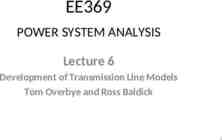The Metro Ethernet Forum Helping Define the Next Generation of
20 Slides492.50 KB

The Metro Ethernet Forum Helping Define the Next Generation of Service and Transport Standards Ron Young Chairman of the Board [email protected] 1

Agenda The Case for Metro Ethernet The Benefits of Standards MEF Overview 2

The Case for Metro Ethernet 3

The Case for Metro Ethernet Ethernet in the Metro The number of sites demanding high speed access and flexible data services is growing fast Ethernet is a mature, predictable and wellstandardized data networking technology Metro Ethernet significantly lowers Total Cost of Ownership, which benefits carriers and their customers 4

The Case for Metro Ethernet Optical Ethernet Simplifying the Network Copper Serial Input Customer’ s Ethernet LAN Coppe r Local Loop Traditional Telco Network Voice-oriented connectivity Telco Central Office ATM MUX CSU/DSCs Sonet ADM Coppe r Telco Central Office Local Loop Sonet ADM MUX Copper Serial Input ATM CSU/DSCs Router s Router s Customer’ s Ethernet LAN Optical IP Network Optical Gigabit Ethernet throughput Metro Fiber Ring Customer’s Ethernet LAN Managed Switch GB WAN Router Long Haul Fiber Metro Fiber Ring GB WAN Router Customer’s Ethernet LAN Managed Switch located in building telco closet 5

The Case for Metro Ethernet The Case for Ethernet Services Advantages for End-Users Flexible services and scalability – Eliminate over-provisioning – Networks readily satisfy growing bandwidth demand – 1 Mbps – 1 Gbps Lower start-up costs – CPE costs reduced by mass scale of Ethernet market Lower engineering and operational support – Simple Ethernet technology Faster service delivery – Point & Click provisioning, no 3-month delays 6

The Case for Metro Ethernet The Case for Ethernet Transport Advantages for Service Providers People – Reduced engineering and support cost – Simplified fault isolation and diagnostics – Dynamic, point & click service provisioning Pipes – Efficient data transport – Economical scalability Ports – Cost-effective network build-outs 7

The Case for Metro Ethernet Market for Metro Ethernet Metro Ethernet is a key growth area for RBOCs, with significant deployments in 2003 (Solomon Smith Barney, RBC, Yankee) 4 billion in annual metro Ethernet service revenue by 2006 in North America (RHK) Strong demand for metro Ethernet in APAC and Europe (RBC Capital Market) 8

The Benefits of Standards Metro Ethernet Has Benefited Greatly from Standards 9

The Benefits of Standards Ethernet Speeds Outpace Moore’s Law 3x Moore’s Law since 1995 10 Gbps equipment begins shipping in 2002 10 Gbps 10 Gbps 3.2 Gbps 1 Gbps 100 Mbps Standard for 100 Base-T Moore’s Law* Ethernet Ethernet IEEE standard Law of IP 10 Mbps 1982 1995 1999 2002 10

The Benefits of Standards Average Selling Price per 1000 Mbps port Ethernet Port Costs are Plummeting 3,500 3,000 2,500 2,000 1,500 1,000 500 0 1997 1998 1999 2000 2001 Source: Dell’Oro Group 2002 2003 2004 11

MEF Overview Metro Ethernet Forum Overview 12

MEF Overview What is the MEF? The Metro Ethernet Forum is a non-profit organization dedicated to accelerating the adoption of optical Ethernet as the technology of choice in metro networks worldwide. 13

MEF Overview Who is the MEF? MEF members are: – Leading service providers – Major incumbent local exchange carriers – Top network equipment vendors – Other prominent networking companies that share an interest in metro Ethernet 14

MEF Overview 65 Members and growing 15

MEF Overview Key Objectives Build consensus and unite service providers, equipment vendors, and end customers behind optical Ethernet services and transport Facilitate implementation of optical Ethernet standards to accelerate delivery of Ethernet services and make Ethernet-based metro transport networks carrier-class Enhance worldwide awareness of the benefits of optical Ethernet services and Ethernet-based metro transport networks 16

MEF Overview Priorities The primary priorities of the MEF are to define: Ethernet Services for metro transport networks Carrier-class Ethernet-based metro transport technologies by specifying architecture, protocols and management systems The secondary priorities of the MEF are to define: Work to be done by other organizations on other transport technologies (liaison activity) Non-Ethernet interfaces, if not defined by others 17

MEF Overview Focus of Work MEF is working to fill the gaps between existing standards needed to standardize complete metro Ethernet networks Technical work is focused on – Ethernet service specifications – Transport network features for protection, QoS and NNIs – End-to-end management, OAM&P – User interface definition 18

Learn more and join the MEF Complete a membership application at: www.MetroEthernetForum.org 19

Optical Ethernet for the Metro Market www.MetroEthernetForum.org 20






